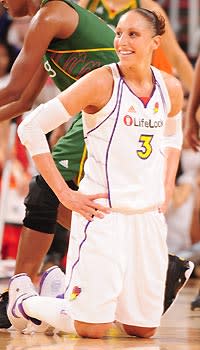Taurasi's travails strangely gave her peace
It is impossible to watch Diana Taurasi, the best player in the WNBA, probably the best women’s player in the world, and not feel the fire burning through your television. Few women – heck, few men – play with what seems like an intense, pulsing glow radiating across the court.
It is also impossible for Diana Taurasi to turn off her fervor. There is no switch, nothing to trip her mind, to tell her basketball is over for the day and it is time to settle down. Instead the pulsing continues. Did she have a good practice? Was she productive? Will she be productive tomorrow?
Will she win? She must always win.
“I think about it 24 hours a day,” she says. “I feel like Bobby Fischer a little bit.”
For all those who mock the WNBA, who think the league that begins its 15th season Friday lacks the seriousness of the NBA, perhaps they have never watched the guard from the Phoenix Mercury, never seen her take charge of a night, careening through the lane to score basket after basket when her teams needs them most.
Every day there is someone to sway – a coach, a teammate an opponent – even after they’ve all acknowledged that she’s probably the best ever. Their affirmations aren’t enough. She has to show them, show herself, tell them the extra 20 minutes of lifting weights, the extra jump shots, the running was worth it, that somehow in the day she is making herself or someone better. Slowing is so hard.
Only this winter she had to stop. The Turkish team for whom she was playing last winter dropped her after she tested positive for a mild stimulant called modafinil. She vehemently denied the allegations, even taking a polygraph test to establish her innocence. Her protestations were so strong, the Mercury’s general manager, Ann Meyers-Drysdale (who was something of the Taurasi of her day), believed her player immediately. Perhaps a part of Taurasi’s intensity is the fact she had never lied to the team in the past, and it seemed hard to believe she would now.
It was only after Taurasi returned to the United States that word came down: The testing company had made a mistake. There had been no positive test. There hadn’t been a stimulant. As if she needed anything more to drive her on the court. This week, the World Anti Doping Agency suspended accreditation for the testing company for six months, as much a validation that Taurasi was telling the truth as any.
But her banishment from the Turkish team also brought a strange but welcome benefit. It prompted her to relax.
She never had time away from basketball before. While playing at the University of Connecticut, there were always summer teams, national teams, tournaments in which to play. Her first four years in the WNBA she’d play the summer-fall league season in the U.S. and then go to Russia to play professionally through the winter and early spring. Add in the Olympics and World Championships and she was exhausted.
Meyers-Drysdale remembers Taurasi’s former college coach Geno Auriemma, who was also coach of the national team last summer, lamenting at the World Championships that Taurasi was there in body but her mind was drained. By missing the rest of the Turkish season, Taurasi could rest.
“Actually, they did her a favor,” Meyers-Drysdale says.
The general manager pauses to consider the notion, then adds, “You know she’s never been healthy since she’s been in the WNBA?”
Now she is.
Where do you go when you’ve won nine championships between college, the WNBA and overseas? You keep pushing.
“To me, it’s like Bill Russell, you sustain it,” Meyers-Drysdale says.
There was a time Taurasi did not like the attention. This came early at Connecticut, one of those rare places where women’s basketball players are festooned with the kind of acclaim most men at even big college basketball schools aren’t. The interviews kept coming. Day after day. The words repeating in her mind. She began dreaming she was doing interviews, sitting up in bed, tying her hair in a bun – as she often did when talking to the media – and prepared for the onslaught of questions until she realized it was nighttime and there was no interview and she could go back to sleep.
Eventually grew out of his and came to dominate women’s college basketball. Twice she was the college player of the year and led UConn to three national titles. For seven years she’s essentially been the face of the WNBA, its best player, the one who generates its few highlights on the nightly roundups, who seizes the games down five with two minutes left, attacking, attacking, attacking until Phoenix finally wins.
This has made her an MVP. This has won her two titles with the Mercury. This has left Auriemma to laugh at the silliness of the question when asked who in the armada of stars who played for him was best. Taurasi.
But there was a price to pay; a heavy one when she was arrested in 2009 and charged by Phoenix police with an “extreme DUI” after she tested with a blood alcohol content of .17, more than twice the legal limit. She later pleaded guilty to a DUI and served a day in jail. A lesser player in the league probably would have avoided the public shame, yet since arrests are a rare thing in the WNBA and Taurasi was the league’s best player, the words “extreme DUI” hummed across the news wires. It was an embarrassment for a league trying to hard to grow.
And yet it was something else too.
“She woke up,” Meyers-Drysdale says. “She made it a positive. She turned her life around.”
Asked exactly what this meant, Meyers_Drysdale replies: “It got her life back. In how she lived away from the game.”
A lot has happened to Taurasi in the last two years. In addition to the DUI and the issue in Turkey, there was also the 2009 murder of Shabtai Kalmanovitch, owner of the Russian team Spartak Moscow for which she played four years after the WNBA season was finished. She was close to Kalmanovitch’s family, Meyers-Drysdale says.
Suddenly Taurasi, who faced so little adversity, for whom everything came easy and as a result was probably given great leeway in return, was forced to grow up a bit. This is never easy. But she began to find peace in simpler things. Once she would have raced home from practice to sit on the couch and text and tweet and email as many friends as possible, surrounding herself with a close but invisible cocoon of safe faces. Since the arrest and the stimulant test, she puts the phone and computer away, ignoring the social media she once craved.
Last year she posed nude on the cover of a national sports magazine. She did not want to do it. It was a lot of control to relinquish. Her agent asked her four times before she agreed and even then she only did so because the agent said it would be a good thing for her to do. It was only after the magazine came out and she saw the photos that she was glad she did the photo shoot.
“As I’ve gotten older I’ve learned how to relax a little more,” she says, insisting she is serious. “I can sit on the couch now and read a magazine or sit on the couch and have a cup of coffee.”
Which is about as much as the most intense player in the WNBA can possibly let go.


